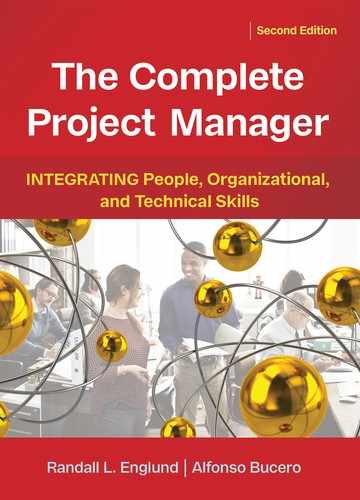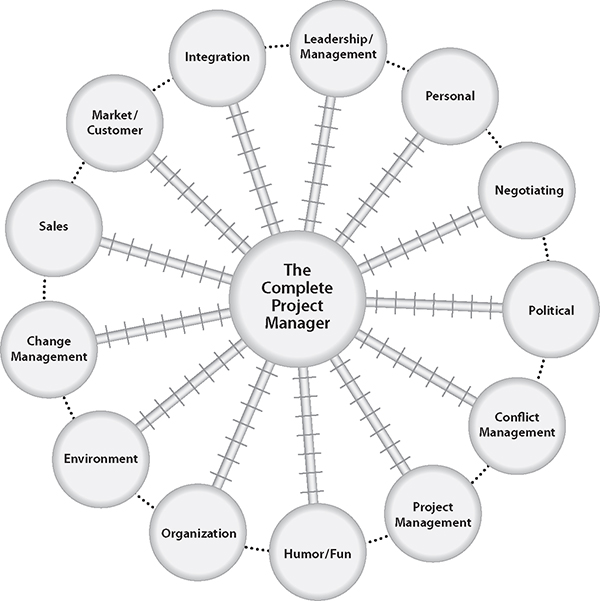Introduction
A person embracing a complete project manager mindset integrates key people, organizational, and technical skills.
Complete versus Incomplete: The Big Picture
Success in any environment largely depends upon completing successful projects, and successful projects get done by skilled project managers and teams, supported by effective project sponsors. Integration of knowledge and skills makes the difference in achieving optimized outcomes.
The complete project manager extends fundamental knowledge of project management to integrate key people, team, business, organizational, and technical skills, drawing upon multiple disciplines for knowledge, practices, and insights. This concept builds upon PMI’s Talent Triangle that addresses technical skills, leadership, and strategy and business. The “right” set of skills to achieve completeness depends on individual starting points, aptitude, attitude, desires, and the supporting context.
It is also a good idea to establish your brand—brand YOU. That way people sense and appreciate consistency in what to expect from your involvement and efforts. Getting results on every assignment and using social media appropriately, including blog postings, are ways to do this. Integrating skills from multiple disciplines and applying them effectively are the means that contribute to the uniqueness that is you.
An organic approach to project management is appropriate: adopt, adapt, and apply effective concepts from nature to make organizations more project (and people) friendly, leading to greater value-added outcomes and better economic results. Embrace a mindset that your actions help create the right environment to “grow” people to produce their best work. This belief states that all leaders need to create healthy environments for people to consistently and sustainably achieve project success.
Much like organic proteins may be complete or incomplete (see Figure I-1), completeness in our context taps your passion, persistence, and patience. Achieving outstanding project and organizational results requires passionate belief in your projects. While this comes easier with worthwhile projects, changed thinking may be required with challenging or questionable projects. That takes time and dedicated effort. A complete project manager needs to persist, much like an infectious mosquito, with all project stakeholders, and use your patience to get results.
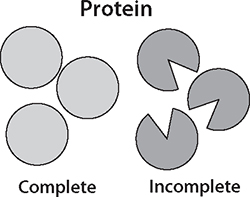
Figure I-1: Protein Models
In contrast, many or perhaps most of us are incomplete when it comes to skills, knowledge, and attitude that lead to consistent project successes. As a consequence, project failures are all too common. We suffer from missed deadlines, insufficient resources and support, missed commitments, surprises, new challenges we are unprepared to meet, unhappy team members and customers, career stagnation, unfulfilled dreams and aspirations, perhaps even depression. We think we are doing our job—after all, we were trained as professionals—but we appear myopic and blind to the bigger picture. Struggles are all too common. We are victims of politics, disappointed that our ideas are not accepted, and do not get others on our side. Strategic goals are a foreign concept. No wonder we are stuck on a plateau. We (the authors) often feel incomplete because of our continuous desire to improve. We need to squarely face personal deficiencies. We strongly believe that continuously moving forward and improving needs to be cultivated by every project manager—lifelong continuous learning.
There is hope. When operating in our strengths, regardless of personality—being introverted or extroverted, quiet or loud—we can get along with others, share the credit, and complement each other. Being mediocre or being overconfident are not good options. When we pair up with people and team members who possess complementary strengths and skills, we become more complete. Opposites can thrive in exquisite harmony.
Sometimes it appears necessary to operate as a project office of one—a POO. With no formal position or authority, these people feel alone within their organizations. They may not have a structured learning system; they keep knowledge to themselves since others may not be ready to receive it; they are “ahead of the pack” in wanting to apply skills and techniques that are not generally accepted. Having both aptitude and interest, they may serve as a central source to identify, schedule, track, and coordinate more effective processes and relationships. This role may be a position to which people devoted to excellence in project work can aspire, as they eventually serve as change agents within organizations.
It seems that the only constant thing in our society during the twenty-first century is change—technical changes, paradigm shifts, project manager behavioral changes. We need always to be ready to change and keep developing. We can do so because of a belief that we all have potential to be excellent; it means making a commitment to be extraordinary. If you are convinced that you can do it, you will achieve your goals.
Being excellent does not necessarily mean being successful; it means doing extraordinary things that you initially thought you would not be able to do. Everybody can put it in practice and try it. Purge “I can’t do it” statements. This journey may not be a path of roses—you may find a lot of thorns along the way—but if you believe, you can.
Today is a wonderful day to start. If you dedicate time and effort to open your mind and face new possibilities, tomorrow will be even better.
CEO Example
Amber Redmann, PMP, CEO of Parasol Alliance in Chicago, provides a stirring testimonial about the value of skills learned and applied as a project manager and how that strong foundation helped this CEO elevate her startup and career:
I feel strongly that our success is based on the skills I learned while earning my project management master’s degree and the Project Management Professional (PMP) certification. In particular, four characteristics typically associated with project managers have been vital in my CEO role:
1. Project managers are organized.
2. Project managers have good people skills.
3. Project managers are influencers.
4. Project managers are decision makers.
Many of my organization’s clients are looking to select and implement new technology systems. We take a project management–based approach to identifying requirements, completing requests for proposals and ultimately selecting vendors that best fit our clients’ needs. Our success shows that clients appreciate the methodology and processes we bring to all this work.
Not a day goes by when I don’t feel grateful for my project management background. It gives me the skill set I need to more efficiently manage my company across the whole gamut of its activities: staffing, recruiting, investor management, client management, and sales. Project management is usually associated with an organization’s trenches—but it’s been just as important to me as a CEO (Redmann 2018).
Are You Ready?
Mark Langley, PMI president and CEO, presented to a PMI audience the following comments:
Yes, ready.
No, no, no, are you ready?
Yeah.
I’m not sure.
Do you have the skills that your organization executives are looking for? Do you know what those skills are? Can you connect what you do every day to your organization’s business goals? Can you demonstrate that you understand the future direction of the organization? And can you help the organization get there ahead of the competition? Are you going to wait for someone to tell you what you should know and what you should do? Or are you already on a path towards that?
Are you developing your personal portfolio of skills to match what the organization needs? Not now, but for the next three to five years, so that you help the organization that you work in beat the competition, be more productive, and deliver value to all the stakeholders? If not, you’re not ready. If you are, you may be in a very select few. And what the organizations are telling us and what we found in our own research is, being technically competent is no longer sufficient. It’s absolutely essential because we can’t be good at project, program, and portfolio management without it, but it’s no longer sufficient. Organizations are looking for so much more.
We’ve heard for about a decade things like soft skills, leadership skills. Organizations are now building into their frameworks for their careers and their program project managers a specific focus on leadership development. Negotiation, communication, conflict resolution, organization change management. A recent report we did on organization agility called out some of the best practices for organizations, one of which was including in the position description for the project and program managers responsibility for organization change management. So, organizations are carving out a second area of focus.
Sound technical skills are absolutely essential, but more importantly leadership skills. And there’s a third area, I call them strategic and business management skills. Do you know as a project or program manager what your organization’s customer relationship management model is? Go-to market strategy? Differentiation strategy in various markets? Innovation strategy, depending on the type of organization you work in? Do you understand it? But more importantly, do you understand how what you do aligns to that or not?
It comes down to a fundamental shift, I think. We’re very good at managing projects, but are we really good at leading change, leading projects?
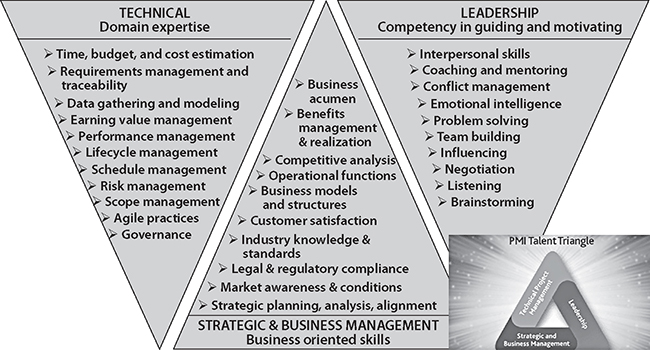
That’s what organizations want. If you take that competency skill profile that looks just like the executive recruiter’s, they’re looking for somebody to lead the organization in a project management context. They’re not looking for any of us to manage projects and programs. They’re looking at us to lead the change in the organization through project and program management. And that’s a fundamental shift that’s been taking place, but I can tell you it’s radically on the rise. Have you ever assessed your talent gap personally or organizationally, if you’re responsible for it? If you haven’t, start today (Langley 2013, excerpted from YouTube.com).
Figure I-2: Detailed PMI Talent Triangle
Mark Langley’s leadership has led the Project Management Institute to embrace the PMI Talent Triangle. In today’s increasingly complex and competitive global marketplace, technical skills are simply not enough. Companies are seeking added skills in leadership and business intelligence to support longer-range strategic objectives that contribute to the bottom line. The ideal skill set depicted in the PMI Talent Triangle (see Figure I-2) is a combination of technical, leadership, and strategic and business management expertise. Developing these employer-demanded skills help individuals stay relevant and competitive.
Outline of Topics
Mark’s comments and the Talent Triangle serve as a perfect introduction to the material in this book, wherein we cover most areas and offer means to assess talent gaps. Each chapter highlights thoughts, experiences, and stories about a particular skill. The companion book The Complete Project Manager’s Toolkit, available online, provides additional toolsets for applying the skills. Here is an outline of what is covered in this book:
• Leadership/management. Leadership and management skills are those vital visionary and “can-do” competencies that are so necessary for those who are in a position to influence colleagues, team members, upper managers, clients, and others. These include charisma, teachability, and courage, as well as delegation, listening, ethics, and relationship-building skills.
• Personal skills. Personal skills are interaction competencies for dealing with people. The complete project manager possesses the aptitude, attitude, influence, and networking skills to interact with people effectively and achieve results.
• Negotiating skills. The results delivered by projects depend upon what you negotiate. It is in your best interest, and for your team and organization, to embrace negotiating as a requisite skill and implement it dutifully.
• Political skills. Complete project managers understand the power structure in their organizations. Influence exists in people’s hearts and minds, where power derives more from legitimacy than from authority. To be effective, project managers need to become politically sensitive.
• Conflict management skills. In situations that matter the most, we often perform at our worst. Learn to assess conflicts, develop a response, and conduct a learning conversation. Embrace constructive contention.
• Project management skills. Complete project managers build upon the foundation established by PMI’s A Guide to the Project Management Body of Knowledge. We add insights and examples as aids for complete project managers in their quest to make sense of and apply the PMBOK Guide to people in organizations.
• The role of humor and fun. We advocate for the use of humor and fun because they make work more effective, productive, and memorable. A project manager’s toolkit is more complete when fun is on the agenda and every day includes laughter.
• Organization skills. An imperative facing complete project managers is not only to embark on a quest to manage project management processes, but also to execute projects within “green” organizations—ones that encourage project-based work. A “green” organization, instead of a “toxic” one, is better positioned not only to survive but to prosper, even in difficult times.
• Environment skills. Complete project managers can make more systemic and widespread progress by focusing attention on creating project-friendly environmental conditions than through any other effort.
• Change management skills. You cannot move forward and stay the same at the same time. The keys to dealing with change successfully are having a good attitude toward it and being prepared to meet it. Understand the change management process.
• Sales skills. Know that you are continuously in sales cycles throughout project life cycles. Do not be a victim of lost sales or opportunities. Embrace the sales process as the means to secure necessary commitments in a genuine manner that is worthy of a complete project manager.
• Market/customer knowledge. All projects have a customer. Complete project managers take care to understand market forces and customer satisfaction issues. Apply servant leadership skills. Implement ethical practices in all interactions.
• Integration and epilogue. Form a more complete picture of your role by integrating key concepts via storytelling, perhaps as a project office of one (POO).
Throughout the book, we emphasize the importance of having a positive attitude and how that approach helps organizations achieve project success.
Visualization
How can a huge multivitamin pill require several in a dose whereas a potent antibiotic is tiny? The answer lies in molecular complexity—a combining of various molecules. We use the structure of a complex molecule as a metaphor to highlight key components of the complete project manager (with thanks to Wikipedia and with apologies to the chemical discipline).
Organic chemistry is a subdiscipline within chemistry involving the scientific study of the structure, properties, composition, reactions, and preparation of carbon-based compounds, hydrocarbons, and their derivatives.
Organic compounds are structurally diverse. The range of application of organic compounds is enormous. They form the basis of, or are important constituents of, many products and almost all earthly life processes.
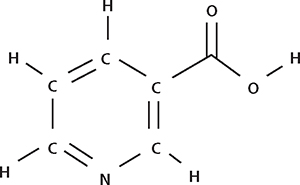
Figure I-3: Molecular Compound
Likewise, project management is the application of knowledge, skills, and techniques to execute projects effectively and efficiently. It is a strategic competency for organizations, enabling them to tie project results to business goals and better compete in their markets. The focus of project management is shaped by the goals, resources, and schedule of each project. The value of that focus is underscored by the rapid, worldwide growth of project management as a recognized and strategic organizational competence in all industries and organizations, as a subject for training and education, and as a career path.
Organic molecules can often contain a higher level of complexity compared to purely inorganic compounds, so the synthesis of organic compounds has developed into one of the most important branches of chemistry. Biochemistry—the chemistry of living organisms, their structure and interactions in a controlled environment and inside living systems—opened up a new chapter of organic chemistry with enormous scope. Biochemistry, like organic chemistry, primarily focuses on compounds containing carbon.
Project management is all about people, and we are struck by the enormous complexity of interests, styles, approaches, and interactive dynamics that are unleashed when we attempt cross-organizational project work. Each day brings new challenges, unheralded actions, and innovations. Behind it all, we must never forget that we are carbon-based creatures, enormously capable but seldom perfect.
The crucial breakthrough for organic chemistry was the concept of chemical structure, wherein carbon atoms could link to each other to form a carbon lattice … the detailed patterns of atomic bonding could be discerned by skillful interpretations of appropriate chemical reactions.
Project management has always been practiced informally, and it began to emerge as a distinct profession in the mid-twentieth century. The Project Management Institute’s A Guide to the Project Management Body of Knowledge (PMBOK Guide 2018) identifies the recurring elements: the five process groups—Initiating, Planning, Executing, Monitoring and Controlling, and Closing—and the ten knowledge areas, Integration, Scope, Time, Cost, Quality, Procurement, Human Resources, Communications, and Risk Management. While this guide provides a basic structure for developing project management skills, linking to other disciplines, such as organization development, sales, and negotiations, is crucial for breakthrough performances.
Early examples of organic reactions and applications were often serendipitous. Then came systematic studies of organic compounds, followed by the synthesis of highly complex molecules via multistep procedures. Total synthesis of complex natural compounds increased in complexity and finally reached commercialization. Pharmaceutical benefits have been substantial. Complexity of total syntheses has been increasing.
Accidental project managers—people who came into the profession with little knowledge of processes and procedures—were, and often still are, common. The PMBOK Guide advanced the profession and provides the foundation to produce deliverables that offer unique results.
In chemistry, the power of an antioxidant depends on its structure, which is made up of rings. Antioxidants use these rings to capture rogue electrons and neutralize free radicals. The more rings, the better it works. Resveratrol from red grapes has only two rings. Catechins from green tea have four rings. In contrast brown algae—ecklonia cava—has eight interconnected rings, making it a veritable electron-trapping, free-radical-killing machine!
An ever-expanding number of professions and industries are embracing project management, recognizing the benefits of a disciplined approach to create new outcomes. This expansion has created a need to develop new ways to apply established processes and has increased demand for practitioners with varied skill sets who can operate in increasingly complex environments. Leaders with robust skill sets can fuse disparate groups into new organizations through organic growth or mergers. These groups can then build novel or innovative solutions.
Today’s research targets feature molecule bearing groups, such that an interchanging of any two groups leads to stereoisomer molecules that have the same molecular formula and sequence of bonded atoms but which differ in the three-dimensional orientations of their atoms in space. Human hands are an example of stereoisomerism—having the same physical properties except for the direction in which they rotate. Two compounds that are mirrors of each other have the same physical properties, except for the direction in which they rotate and how they interact with other compounds. They may have substantially different biological effects. (See Figure I-4.)
No longer will one job description suffice for managing projects, programs, and portfolios.
In contrast to many inorganic materials, organic compounds typically melt, and many boil. The melting and boiling points correlate with the polarity of the molecules and their molecular weight. Organic compounds are usually not very stable at temperatures above 300°C.
Such is life. People have their limits, and when those limits are reached, they totally disengage—melt away—or they boil over in emotional outbursts. These reactions are attributable both to natural personality inclinations and to the coping skills a person has developed. Complete project managers are able to maintain greater stability.
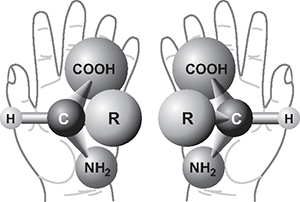
Figure I-4: Stereoisomer Molecules
Figure I-5: A Complete Project Manager “Molecule”
Life on Earth is made of left-handed amino acids, almost exclusively, because they are made of similar acids that formed in space and fell to Earth in meteorites. Why do amino acids in space favor left? No one really knows, but it is known that radiation can also exist in left- and right-handed forms.
New possibilities can emerge from concentrated intent and research. Is it possible to create right-handed molecules? Who knows? Maybe, because they are known to exist. Similarly, the possibilities are unlimited for complete project managers who strive to develop new skills. The profession of project, program, and portfolio management will truly benefit from their efforts.
You can use Figure I-5 as a guideline or outline in a journey to build your own combination of “molecules”—your project management skill set.

WARNING: BECOMING A COMPLETE PROJECT MANAGER MAY ENHANCE SELF-ESTEEM, LEAD TO GREATER OPPORTUNITIES, RESULT IN CONSISTENTLY DELIVERING OPTIMIZED RESULTS, AND INCREASE PERSONAL SATISFACTION. ARE YOU READY?
